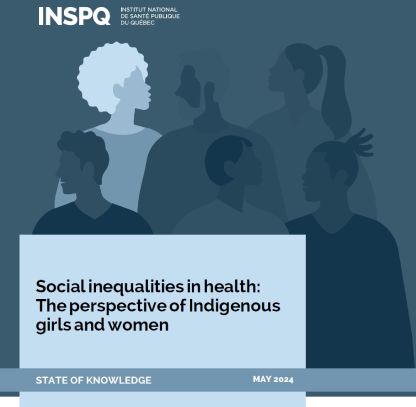Social inequalities in health: The perspective of Indigenous girls and women
While Indigenous women are central to local development, lifelong social inequalities in health can be a barrier to their full participation in the social, cultural and economic life of their community. Current and future actions targeting gender equality need to be adapted to the realities of First Nations and Inuit women. This knowledge synthesis is intended to help guide those actions by explaining the systemic and structural factors that disproportionately influence their health and wellbeing.
- The qualitative literature on which this synthesis is based comprises eleven peer-reviewed articles and three research reports. The analysis identifies five health-related areas in which Indigenous girls and women report being at a disadvantage: violence (experiences of gender-based and domestic violence), sexual health (e.g., access to screening tests), perinatal health (pre- and post-delivery care and services), mental health (including stress and anxiety), and health behaviours (e.g., food security and smoking).
- Indigenous girls and women point to factors favourable to their health and wellbeing: cultural continuity, culturally safe healthcare services, and self-determination. Being connected with their culture, participating in cultural and spiritual activities, establishing a relationship of trust with care providers, and involving women in significant decisions about the community are all seen as beneficial, for example by ensuring easier access to health services and a better sense of their mental health.
- The negative impact of certain systems—health, justice, education and social services—on the health and wellbeing of Indigenous girls and women comes up in nearly all the selected literature. For example, women may remain in a situation of domestic violence because they have no other viable option or in order to avoid alerting youth protection services, which they mistrust. Moreover, participants living in remote areas report gaps in the availability of services: a lack of continuity, transportation unavailable or expensive, and employee turnover.
- Issues related to colonial governance and ideologies hold an important place in the discourse of Indigenous women. Many participants describe experiences of racism, discrimination, marginalization and historical trauma negatively affecting their health and wellbeing. Those experiences are a barrier to accessing care and services, and also contribute to the normalization of violence against Indigenous women.
- Participants report taking on many domestic chores and responsibilities, which exacerbates gender inequality and negatively impacts their health. Responsibility overload, coupled with a lack of recognition and validation, increases stress while reducing access to care. Women report being overwhelmed by the responsibilities others expect them to assume.


